完形填空易挖空部分
超实用高考英语复习:完形填空--易错完形填空考点(10)(原卷版)

完形填空--易错考点(10)距离高考还有一段时间,不少有经验的老师都会提醒考生,愈是临近高考,能否咬紧牙关、学会自我调节,态度是否主动积极,安排是否科学合理,能不能保持良好的心态、以饱满的情绪迎接挑战,其效果往往大不一样。
以下是本人从事10多年教学经验总结出的以下学习资料,希望可以帮助大家提高答题的正确率,希望对你有所帮助,有志者事竟成!养成良好的答题习惯,是决定高考英语成败的决定性因素之一。
做题前,要认真阅读题目要求、题干和选项,并对答案内容作出合理预测;答题时,切忌跟着感觉走,最好按照题目序号来做,不会的或存在疑问的,要做好标记,要善于发现,找到题目的题眼所在,规范答题,书写工整;答题完毕时,要认真检查,查漏补缺,纠正错误。
总之,在最后的复习阶段,学生们不要加大练习量。
在这个时候,学生要尽快找到适合自己的答题方式,最重要的是以平常心去面对考试。
英语最后的复习要树立信心,考试的时候遇到难题要想“别人也难”,遇到容易的则要想“细心审题”。
越到最后,考生越要回归基础,单词最好再梳理一遍,这样有利于提高阅读理解的效率。
另附高考复习方法和考前30天冲刺复习方法。
完形填空是每年高考的必考题型,高考完形填空遵循“以实词为主、虚词为辅、突出词汇语境化”的命题原则,设空词类主要是四类词:名词、动词、形容词、副词;偶尔还涉及介词(短语)等。
完形填空涉及高中英语中的各个分册中的每个单元。
易错10……完形填空--易错考点(10)【高考典例】【2023年1月·浙江卷】阅读下面短文,从短文后各题所给的A、B、C和D四个选项中,选出可以填入空白处的最佳选项,并在答题卡上将该项涂黑。
The sun was beginning to sink as I set off into the Harenna Forest. I was on my way to ____1____ a unique honey harvest. Here, in south-east Ethiopia, hand-carved beehives(蜂箱)are placed in the ____2____. Reaching them to get the honey is difficult—and often ____3____ .I ___4____ beekeeper Ziyad over a wide stretch of grassland before entering a thick jungle. Ziyad began preparations. He ____5____ handfuls of damp tree leaves, wrapped them with string, and ____6____ the bunch to create a torch(火把). Then, with one end of a rope tied to his waist and the other end around the trunk of a tree, Ziyad began ____7____ . He stopped every few minutes to move the ____8____ higher up the tree trunk.____9____ , Ziyad got close to the hive which was around 20 metres above the ground. Sitting on a branch, he _____10_____ towards it and blew smoke from his torch into a tiny hole in the hive. Suddenly, Ziyad let out a sharp cry. Within seconds, he’d _____11_____ the trunk and was back on the ground.It was too _____12_____ to collect the honey. A cool summer had delayed _____13_____ . Baby bees were still in the honeycombs(蜂巢). The adult bees were _____14_____ and kept attacking as Ziyad escaped from the tree. He had to wait for the right _____15_____ to go back up.1.A.share B.collect C.celebrate D.witness2.A.courtyards B.fields C.treetops D.caves3.A.urgent B.dangerous C.expensive D.pointless4.A.searched B.recognised C.followed D.invited5.A.gathered B.cleaned C.dropped D.checked6.A.shook B.lit C.measured D.decorated7.A.jumping B.talking C.testing D.climbing8.A.hives B.leaves C.rope D.honey9.A.Finally B.Surprisingly C.Naturally D.Immediately10.A.backed B.dived C.shouted D.inched11.A.cut off B.gone up C.slid down D.held onto12.A.high B.early C.fast D.close13.A.hatching B.training C.sowing D.trading14.A.curious B.hungry C.bored D.angry15.A.moment B.equipment C.person D.order【易错分析】错误原因1.忽视首句信息的指导意义;2.忽视上下文的语境;3.没有把握文章的主题;4.忽视文章作者的情感走势。
人教新课标必修四Unit 1 Women of achievement 课文挖空 完形填空设计
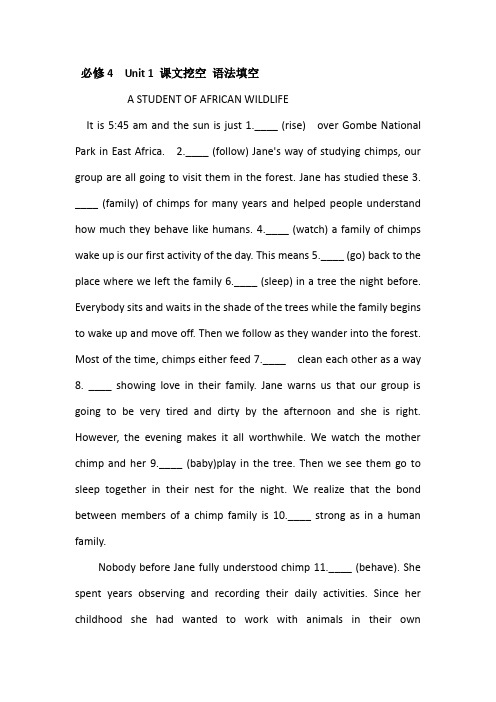
必修4 Unit 1 课文挖空语法填空A STUDENT OF AFRICAN WILDLIFEIt is 5:45 am and the sun is just 1.____ (rise) over Gombe National Park in East Africa. 2.____ (follow) Jane's way of studying chimps, our group are all going to visit them in the forest. Jane has studied these 3. ____ (family) of chimps for many years and helped people understand how much they behave like humans. 4.____ (watch) a family of chimps wake up is our first activity of the day. This means 5.____ (go) back to the place where we left the family 6.____ (sleep) in a tree the night before. Everybody sits and waits in the shade of the trees while the family begins to wake up and move off. Then we follow as they wander into the forest. Most of the time, chimps either feed 7.____ clean each other as a way 8. ____ showing love in their family. Jane warns us that our group is going to be very tired and dirty by the afternoon and she is right. However, the evening makes it all worthwhile. We watch the mother chimp and her 9.____ (baby)play in the tree. Then we see them go to sleep together in their nest for the night. We realize that the bond between members of a chimp family is 10.____ strong as in a human family.Nobody before Jane fully understood chimp 11.____ (behave). She spent years observing and recording their daily activities. Since her childhood she had wanted to work with animals in their ownenvironment. However, this was not easy. When she first arrived in Gombe in 1960, it was 12. ____ (usual) for a woman to live in the forest. Only after her mother came to help her for the first few months was she allowed 13. ____ (begin) her project. Her work changed the way people think about chimps. For example, one important thing she discovered was 14.____ chimps hunt and eat meat. Until then everyone had thought chimps ate only fruit and nuts. She actually observed chimps as a group hunting a monkey and then 15.____ (eat) it. She also discovered how chimps communicate with each other, and her study of their body language helped her work out their social system.For forty years Jane Goodall has been outspoken about making the rest of the world understand and respect the life of these animals. She has argued that wild animals should 16.____ (leave) in the wild and not used for entertainment or advertisements. She has helped to set up special places 17.____ they can live safely. She is leading a busy life but she says: "Once I stop, it all comes crowding in and I remember the chimps in 18.____ ( laboratory ). It's terrible. It affects me when I watch the wild chimps.I say to myself, ''Aren't they lucky?” And then I think about small chimps in cages though they have done nothing wrong. Once you have seen that you can never forget ..."She has achieved everything she wanted to do: working withanimals in their own environment, gaining a doctor's degree and showing that women can live in the forest 19.____men can. She inspires those who want to cheer the achievements of women.1.答案:rising解析:此处考查动词的现在进行时形式。
完形填空题特点及应试技巧
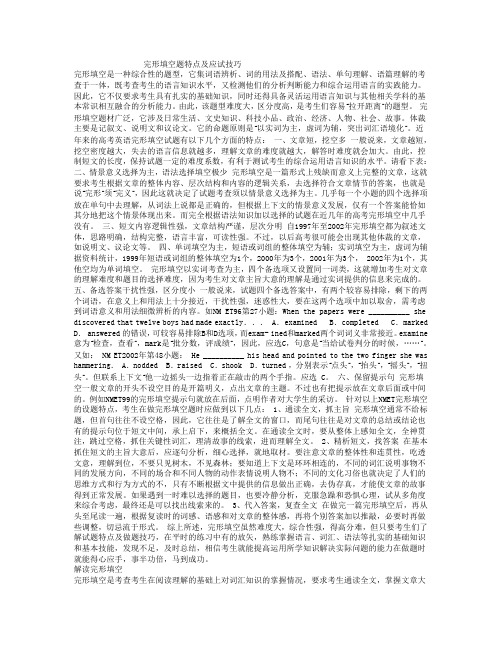
完形填空题特点及应试技巧完形填空是一种综合性的题型,它集词语辨析、词的用法及搭配、语法、单句理解、语篇理解的考查于一体,既考查考生的语言知识水平,又检测他们的分析判断能力和综合运用语言的实践能力。
因此,它不仅要求考生具有扎实的基础知识,同时还得具备灵活运用语言知识与其他相关学科的基本常识相互融合的分析能力。
由此,该题型难度大,区分度高,是考生们容易“拉开距离”的题型。
完形填空题材广泛,它涉及日常生活、文史知识、科技小品、政治、经济、人物、社会、故事。
体裁主要是记叙文、说明文和议论文。
它的命题原则是“以实词为主,虚词为辅,突出词汇语境化”。
近年来的高考英语完形填空试题有以下几个方面的特点:一、文章短,挖空多一般说来,文章越短,挖空密度越大,失去的语言信息就越多,理解文章的难度就越大,解答时难度就会加大。
由此,控制短文的长度,保持试题一定的难度系数,有利于测试考生的综合运用语言知识的水平。
请看下表:二、情景意义选择为主,语法选择填空极少完形填空是一篇形式上残缺而意义上完整的文章,这就要求考生根据文章的整体内容、层次结构和内容的逻辑关系,去选择符合文章情节的答案,也就是说“完形”须“完义”,因此这就决定了试题考查须以情景意义选择为主。
几乎每一个小题的四个选择项放在单句中去理解,从词法上说都是正确的,但根据上下文的情景意义发展,仅有一个答案能恰如其分地把这个情景体现出来。
而完全根据语法知识加以选择的试题在近几年的高考完形填空中几乎没有。
三、短文内容逻辑性强,文章结构严谨,层次分明自1997年至2002年完形填空都为叙述文体,思路明确,结构完整,语言丰富,可读性强。
不过,以后高考很可能会出现其他体裁的文章,如说明文、议论文等。
四、单词填空为主,短语或词组的整体填空为辅;实词填空为主,虚词为辅据资料统计,1999年短语或词组的整体填空为1个,2000年为3个,2001年为3个, 2002年为1个,其他空均为单词填空。
23年天津一中中考复习之完型填空答题技巧

"Stars might not be so afraid tonight," I say.
①时间、地点、人物及事件。
②首段的第一、二句以及每段的第一句,预 测或推断短文内容。
2.细读填选: ①细读文章,尤其细读挖空句,先不看选项,联系前后文、结合语篇,自己推测答案。 ②留意语法(如单词变化、短语搭配、句型结构等) 单词考点: (1)名词:联系主题及空格前后关键词注意性和数保持一致。 (2) 动词:注意词意和短语的搭配,区分近义词之间的用法差异,以及动词的形式 (3)介词:注意其惯用法,尤其动词短语搭配 (4)代词:注意性和数保持一致 (5)连词:注意分析前后句和上下文逻辑 (6)形容词/副词:注意词义的区别,比较时要注意词形的变化
36. B
On the fourth floor, the lift stops suddenly and it goes dark. I feel my ___36____
beating in my ears. 【解析】固定搭配,结合语境 (heart beats ) 在第四层时,电梯突然停下来,一片漆黑,我觉得我听到了自己心在跳(紧张,害 怕)。
37.D
Grandma takes my hand, and we walk __37___ the stairs to the first floor. 【解析】联系上下文 奶奶抓着我的手,然后我们一起走下楼梯,到了一楼。
2024届新高考英语冲刺复习:完形填空解题攻略

完形填空十大解题技巧
二.通过“文化背景”解题 [剖析]英语本身就充满了与众不同的语言文化,利用其文化特征解题通 常是很好的一个切入点。27空前后提到加拿大医科学校不招收女学生 是当时的一种社会文化,了解这个背景,再联系文中unfortunately, therefore等信息就可以选出该题的正确答案。 [答案]D
完形填空三大着眼点
三.语篇层次题 语篇层次类题目是指无法在句内或句组确定答案,需要结合整个语篇才 能找到正确答案的题目。这类题目主要考查考生的篇章分析能力。命题 角度通常有上下文语义理解和逻辑关系两种。
完形填空三大着眼点
三.语篇层次题 [典例]“How can you say it's (boring)?Have you read it?”asked Aunt Dede. “No,it's too long and it doesn't have any 49 ,”complained Lainey. “Oh,that's where you are (wrong);there are lots of pictures.Every page is full of pictures; you just have to read the words to (see) them.It's like magic.” 49. A. pictures B. stories C. adventures D. conversations [剖析]根据50空后Dede的回答“...there are lots of pictures.Every page is full of pictures...”可知,Lainey抱怨书中没有图片。 [答案]A
完形填空十大解题技巧
完形解题思路与挖空练习
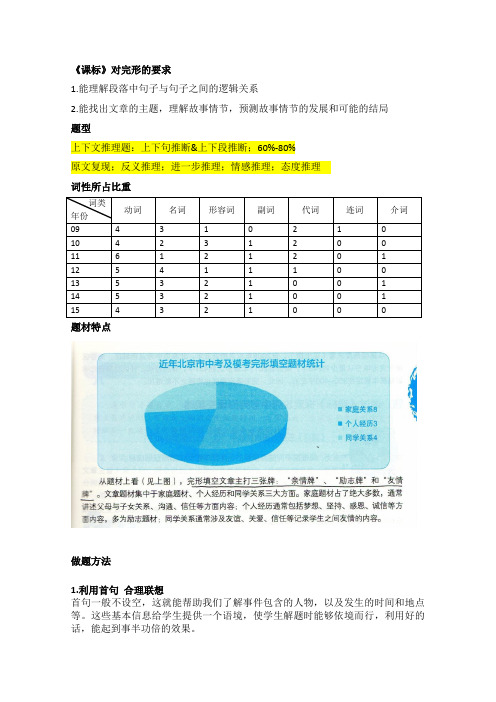
《课标》对完形的要求1.能理解段落中句子与句子之间的逻辑关系2.能找出文章的主题,理解故事情节,预测故事情节的发展和可能的结局题型上下文推理题:上下句推断&上下段推断;60%-80%原文复现;反义推理;进一步推理;情感推理;态度推理词性所占比重题材特点做题方法1.利用首句合理联想首句一般不设空,这就能帮助我们了解事件包含的人物,以及发生的时间和地点等。
这些基本信息给学生提供一个语境,使学生解题时能够依境而行,利用好的话,能起到事半功倍的效果。
VS拼图,首先知道这个图要拼的是“白雪公主和七个小矮人”。
2.扫读全文零星答题(5分钟)通读全文,摸清作者的观点态度和事件发生的大致脉络,这样能为我们准确理解句与句、段与段之间的关系。
零星答题即只答自己有十足把握的。
3.细读全文瞻前顾后(8分钟)根据句子所处的上句下句,甚至上段下段来推断答案,答题时一定注意瞻前顾后综合分析。
先做有把握的,实在拿不准的,待做完之后再回头仔细推敲。
4. 认真复查,适当调整(2分钟)把短文从头到尾再读一遍,检查一下填空以后的文章是否连贯,情节是否合理,语法结构是否正确。
中考改革,词汇量减少,我们应该更注重什么?我们应该从一篇完形中获取什么?理理解语境中实词的内涵领会情节发展和情感主线领悟作品的精神内涵并能有自己的情感体验。
同文多读,领会语言魅力,按主题分类添加到自己的语用库中,恰当运用到作文中假如完形填空变成了中文某登山俱乐部组织了一次攀登珠穆朗玛峰的活动。
许多___1__爱好者纷纷报名参加。
在一个风和日丽的日子,他们开始了这趟______2_____的活动。
在最初的___3___米,大家都兴致勃勃,谁都不甘落后。
第二个1000米,一小部分人开始气喘吁吁,体力明显不支。
到了第三个1000米,好几个人___4___了挑战。
坚持到第六个1000米时,原来四五十人的大队伍只剩下不到10个人了。
看样子这几个人都是决心坚持到底了。
___5__在到达6400米的高度时一个人突然停了下来。
2020高考英语完形填空最全解题技巧, 建议人手一份! (附高频词汇)
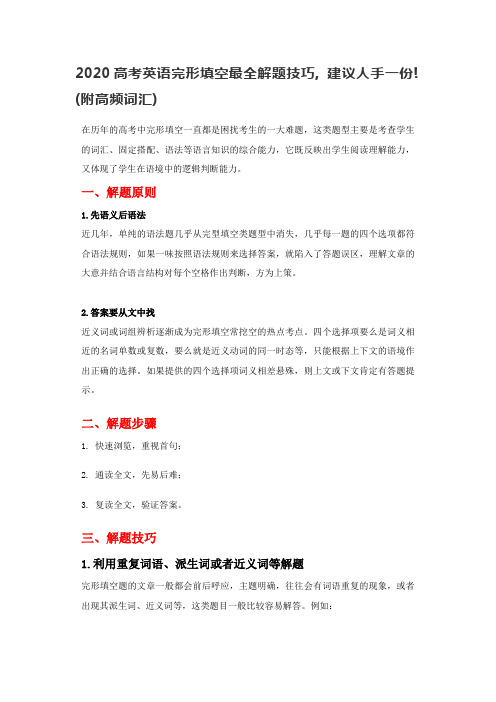
2020高考英语完形填空最全解题技巧, 建议人手一份! (附高频词汇)在历年的高考中完形填空一直都是困扰考生的一大难题,这类题型主要是考查学生的词汇、固定搭配、语法等语言知识的综合能力,它既反映出学生阅读理解能力,又体现了学生在语境中的逻辑判断能力。
一、解题原则1.先语义后语法近几年,单纯的语法题几乎从完型填空类题型中消失,几乎每一题的四个选项都符合语法规则,如果一味按照语法规则来选择答案,就陷入了答题误区,理解文章的大意并结合语言结构对每个空格作出判断,方为上策。
2.答案要从文中找近义词或词组辨析逐渐成为完形填空常挖空的热点考点。
四个选择项要么是词义相近的名词单数或复数,要么就是近义动词的同一时态等,只能根据上下文的语境作出正确的选择。
如果提供的四个选择项词义相差悬殊,则上文或下文肯定有答题提示。
二、解题步骤1. 快速浏览,重视首句;2. 通读全文,先易后难;3. 复读全文,验证答案。
三、解题技巧1.利用重复词语、派生词或者近义词等解题完形填空题的文章一般都会前后呼应,主题明确,往往会有词语重复的现象,或者出现其派生词、近义词等,这类题目一般比较容易解答。
例如:2.利用逻辑关系解题所谓的逻辑关系其实并不抽象,它往往通过转折、让步、递进、因果等明确的逻辑关系词来体现。
当然,句子的逻辑关系也不一定体现在一句话的内部,还有可能会渗透到篇章的层面上,在句与句之间表现出来。
如果能充分利用这些逻辑关系词,我们就可以迅速理清文章的脉络,弄清上下文关系。
3.利用上下文线索解题对于大部分完形填空题目,我们需要通过上下文线索解题。
有些解题的线索就在题目的附近。
4.利用文化背景知识和生活常识解题有些完形填空的文章渗透着相关的文化背景知识和生活常识,如:科学知识、历史、地理知识、风俗民情、民族习惯等。
高中生应掌握丰富的文化背景知识和生活常识,具备了一定的价值判断能力。
在做题时,如果能积极地调动自己的文化背景知识和生活常识,将会大大简化复杂的分析与判断思维过程,节省宝贵的时间,顺理成章地顺着作者的思路阅读下去。
英语完型填空题型及解题技巧
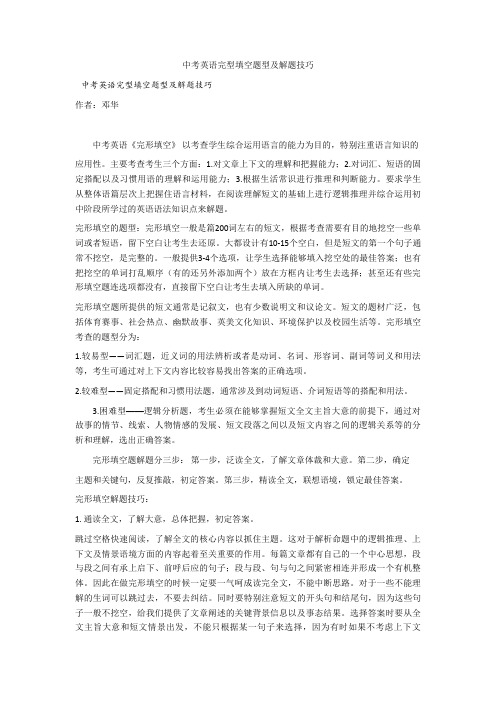
中考英语完型填空题型及解题技巧中考英语完型填空题型及解题技巧作者:邓华中考英语《完形填空》以考查学生综合运用语言的能力为目的,特别注重语言知识的应用性。
主要考查考生三个方面:1.对文章上下文的理解和把握能力;2.对词汇、短语的固定搭配以及习惯用语的理解和运用能力;3.根据生活常识进行推理和判断能力。
要求学生从整体语篇层次上把握住语言材料,在阅读理解短文的基础上进行逻辑推理并综合运用初中阶段所学过的英语语法知识点来解题。
完形填空的题型:完形填空一般是篇200词左右的短文,根据考查需要有目的地挖空一些单词或者短语,留下空白让考生去还原。
大都设计有10-15个空白,但是短文的第一个句子通常不挖空,是完整的。
一般提供3-4个选项,让学生选择能够填入挖空处的最佳答案;也有把挖空的单词打乱顺序(有的还另外添加两个)放在方框内让考生去选择;甚至还有些完形填空题连选项都没有,直接留下空白让考生去填入所缺的单词。
完形填空题所提供的短文通常是记叙文,也有少数说明文和议论文。
短文的题材广泛,包括体育赛事、社会热点、幽默故事、英美文化知识、环境保护以及校园生活等。
完形填空考查的题型分为:1.较易型——词汇题,近义词的用法辨析或者是动词、名词、形容词、副词等词义和用法等,考生可通过对上下文内容比较容易找出答案的正确选项。
2.较难型——固定搭配和习惯用法题,通常涉及到动词短语、介词短语等的搭配和用法。
3.困难型——逻辑分析题,考生必须在能够掌握短文全文主旨大意的前提下,通过对故事的情节、线索、人物情感的发展、短文段落之间以及短文内容之间的逻辑关系等的分析和理解,选出正确答案。
完形填空题解题分三步:第一步,泛读全文,了解文章体裁和大意。
第二步,确定主题和关键句,反复推敲,初定答案。
第三步,精读全文,联想语境,锁定最佳答案。
完形填空解题技巧:1. 通读全文,了解大意,总体把握,初定答案。
跳过空格快速阅读,了解全文的核心内容以抓住主题。
高考英语完型填空题的解题技巧
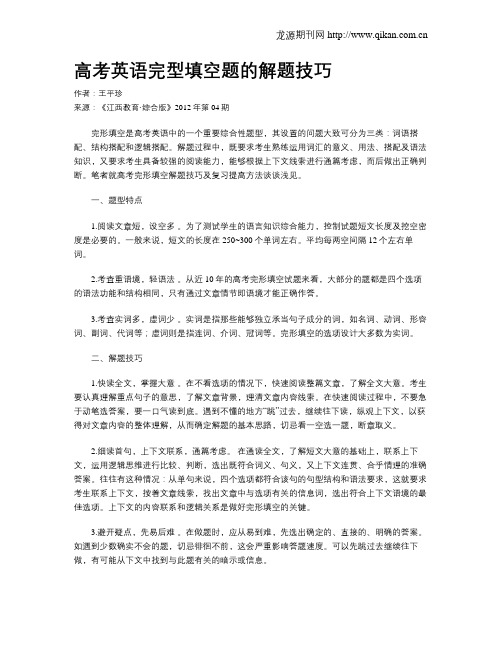
高考英语完型填空题的解题技巧作者:王平珍来源:《江西教育·综合版》2012年第04期完形填空是高考英语中的一个重要综合性题型,其设置的问题大致可分为三类:词语搭配、结构搭配和逻辑搭配。
解题过程中,既要求考生熟练运用词汇的意义、用法、搭配及语法知识,又要求考生具备较强的阅读能力,能够根据上下文线索进行通篇考虑,而后做出正确判断。
笔者就高考完形填空解题技巧及复习提高方法谈谈浅见。
一、题型特点1.阅读文章短,设空多。
为了测试学生的语言知识综合能力,控制试题短文长度及挖空密度是必要的。
一般来说,短文的长度在250~300个单词左右。
平均每两空间隔12个左右单词。
2.考查重语境,轻语法。
从近10年的高考完形填空试题来看,大部分的题都是四个选项的语法功能和结构相同,只有通过文章情节即语境才能正确作答。
3.考查实词多,虚词少。
实词是指那些能够独立承当句子成分的词,如名词、动词、形容词、副词、代词等;虚词则是指连词、介词、冠词等。
完形填空的选项设计大多数为实词。
二、解题技巧1.快读全文,掌握大意。
在不看选项的情况下,快速阅读整篇文章,了解全文大意。
考生要认真理解重点句子的意思,了解文章背景,理清文章内容线索。
在快速阅读过程中,不要急于动笔选答案,要一口气读到底。
遇到不懂的地方“跳”过去,继续往下读,纵观上下文,以获得对文章内容的整体理解,从而确定解题的基本思路,切忌看一空选一题,断章取义。
2.细读首句,上下文联系,通篇考虑。
在通读全文,了解短文大意的基础上,联系上下文,运用逻辑思维进行比较、判断,选出既符合词义、句义,又上下文连贯、合乎情理的准确答案。
往往有这种情况:从单句来说,四个选项都符合该句的句型结构和语法要求,这就要求考生联系上下文,按着文章线索,找出文章中与选项有关的信息词,选出符合上下文语境的最佳选项。
上下文的内容联系和逻辑关系是做好完形填空的关键。
3.避开疑点,先易后难。
在做题时,应从易到难,先选出确定的、直接的、明确的答案。
完形填空解题技巧大全
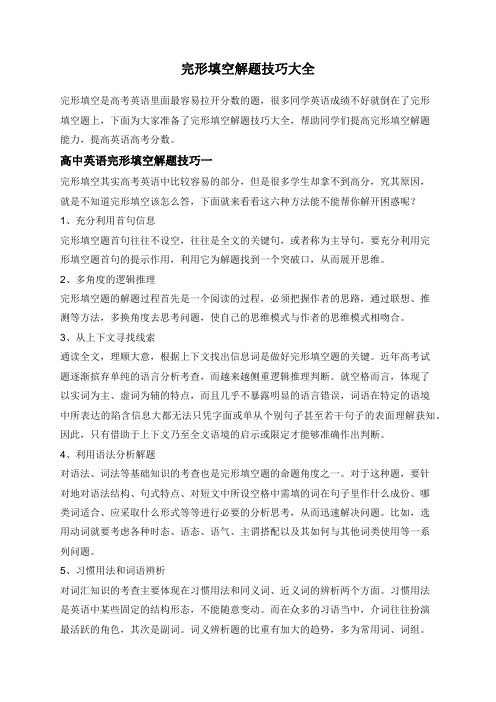
完形填空解题技巧大全完形填空是高考英语里面最容易拉开分数的题,很多同学英语成绩不好就倒在了完形填空题上,下面为大家准备了完形填空解题技巧大全,帮助同学们提高完形填空解题能力,提高英语高考分数。
高中英语完形填空解题技巧一完形填空其实高考英语中比较容易的部分,但是很多学生却拿不到高分,究其原因,就是不知道完形填空该怎么答,下面就来看看这六种方法能不能帮你解开困惑呢?1、充分利用首句信息完形填空题首句往往不设空,往往是全文的关键句,或者称为主导句,要充分利用完形填空题首句的提示作用,利用它为解题找到一个突破口,从而展开思维。
2、多角度的逻辑推理完形填空题的解题过程首先是一个阅读的过程,必须把握作者的思路,通过联想、推测等方法,多换角度去思考问题,使自己的思维模式与作者的思维模式相吻合。
3、从上下文寻找线索通读全文,理顺大意,根据上下文找出信息词是做好完形填空题的关键。
近年高考试题逐渐摈弃单纯的语言分析考查,而越来越侧重逻辑推理判断。
就空格而言,体现了以实词为主、虚词为辅的特点,而且几乎不暴露明显的语言错误,词语在特定的语境中所表达的陷含信息大都无法只凭字面或单从个别句子甚至若干句子的表面理解获知。
因此,只有借助于上下文乃至全文语境的启示或限定才能够准确作出判断。
4、利用语法分析解题对语法、词法等基础知识的考查也是完形填空题的命题角度之一。
对于这种题,要针对地对语法结构、句式特点、对短文中所设空格中需填的词在句子里作什么成份、哪类词适合、应采取什么形式等等进行必要的分析思考,从而迅速解决问题。
比如,选用动词就要考虑各种时态、语态、语气、主谓搭配以及其如何与其他词类使用等一系列问题。
5、习惯用法和词语辨析对词汇知识的考查主要体现在习惯用法和同义词、近义词的辨析两个方面。
习惯用法是英语中某些固定的结构形态,不能随意变动。
而在众多的习语当中,介词往往扮演最活跃的角色,其次是副词。
词义辨析题的比重有加大的趋势,多为常用词、词组。
高中英语完形填空答题技巧
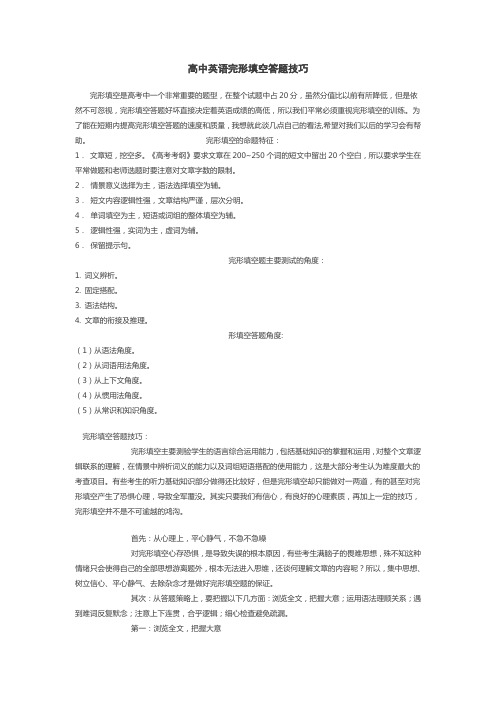
高中英语完形填空答题技巧完形填空是高考中一个非常重要的题型,在整个试题中占20分,虽然分值比以前有所降低,但是依然不可忽视,完形填空答题好坏直接决定着英语成绩的高低,所以我们平常必须重视完形填空的训练。
为了能在短期内提高完形填空答题的速度和质量,我想就此谈几点自己的看法,希望对我们以后的学习会有帮助。
完形填空的命题特征:1.文章短,挖空多。
《高考考纲》要求文章在200~250个词的短文中留出20个空白,所以要求学生在平常做题和老师选题时要注意对文章字数的限制。
2.情景意义选择为主,语法选择填空为辅。
3.短文内容逻辑性强,文章结构严谨,层次分明。
4.单词填空为主,短语或词组的整体填空为辅。
5.逻辑性强,实词为主,虚词为辅。
6.保留提示句。
完形填空题主要测试的角度:1. 词义辨析。
2. 固定搭配。
3. 语法结构。
4. 文章的衔接及推理。
形填空答题角度:(1)从语法角度。
(2)从词语用法角度。
(3)从上下文角度。
(4)从惯用法角度。
(5)从常识和知识角度。
完形填空答题技巧:完形填空主要测验学生的语言综合运用能力,包括基础知识的掌握和运用,对整个文章逻辑联系的理解,在情景中辨析词义的能力以及词组短语搭配的使用能力,这是大部分考生认为难度最大的考查项目。
有些考生的听力基础知识部分做得还比较好,但是完形填空却只能做对一两道,有的甚至对完形填空产生了恐惧心理,导致全军覆没。
其实只要我们有信心,有良好的心理素质,再加上一定的技巧,完形填空并不是不可逾越的鸿沟。
首先:从心理上,平心静气,不急不急噪对完形填空心存恐惧,是导致失误的根本原因,有些考生满脑子的畏难思想,殊不知这种情绪只会使得自己的全部思想游离题外,根本无法进入思维,还谈何理解文章的内容呢?所以,集中思想、树立信心、平心静气、去除杂念才是做好完形填空题的保证。
其次:从答题策略上,要把握以下几方面:浏览全文,把握大意;运用语法理顺关系;遇到难词反复默念;注意上下连贯,合乎逻辑;细心检查避免疏漏。
挖空练习题
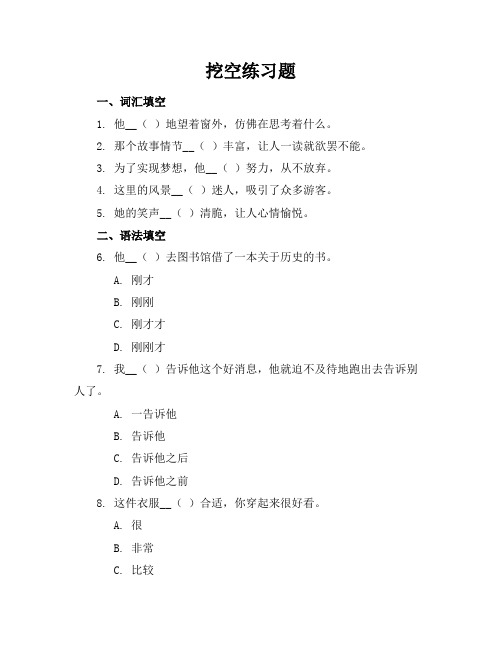
挖空练习题一、词汇填空1. 他__()地望着窗外,仿佛在思考着什么。
2. 那个故事情节__()丰富,让人一读就欲罢不能。
3. 为了实现梦想,他__()努力,从不放弃。
4. 这里的风景__()迷人,吸引了众多游客。
5. 她的笑声__()清脆,让人心情愉悦。
二、语法填空6. 他__()去图书馆借了一本关于历史的书。
A. 刚才B. 刚刚C. 刚才才D. 刚刚才7. 我__()告诉他这个好消息,他就迫不及待地跑出去告诉别人了。
A. 一告诉他B. 告诉他C. 告诉他之后D. 告诉他之前8. 这件衣服__()合适,你穿起来很好看。
A. 很B. 非常C. 比较D. 相当A. 不仅B. 而且C. 虽然D. 但是10. 我们__()去公园散步,__()在附近的咖啡馆喝杯咖啡。
A. 不仅;而且B. 不仅;还C. 不但;而且D. 不但;还三、句型转换11. 请将下列句子改为否定句:原句:他每天早上都去跑步。
改写:他每天早上__()去跑步。
12. 请将下列句子改为一般疑问句:原句:她喜欢听音乐。
改写:她__()喜欢听音乐?13. 请将下列句子改为过去进行时:原句:他正在写作业。
改写:他__()写作业。
14. 请将下列句子改为比较级:原句:这个苹果很好吃。
改写:这个苹果__()那个苹果好吃。
15. 请将下列句子改为将来时:原句:他明天会去北京。
改写:他__()去北京。
四、阅读理解填空16. 阅读下面的文章,根据文章内容填空:玛丽__()喜欢旅行,她认为旅行可以拓宽视野,丰富人生。
去年,她__()去了欧洲,游览了许多著名的景点。
她__()计划今年去亚洲,感受不同的文化。
17. 阅读下面的文章,根据文章内容填空:为了提高学生的英语水平,学校__()开展了一系列英语活动。
学生们__()积极参加,通过这些活动,他们的英语水平得到了__()提高。
五、完形填空18. 请根据上下文,选择最合适的词语填空:我们__()去公园散步,__()在附近的咖啡馆喝杯咖啡。
精简 高考英语完形填空解题技巧分析
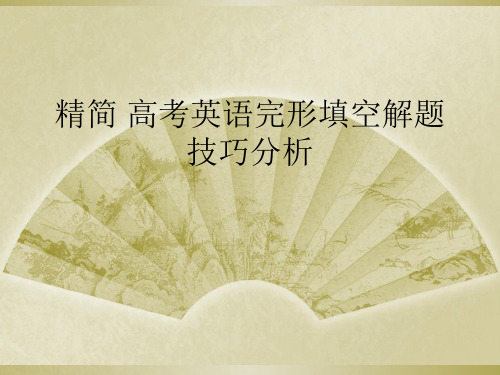
★They are some of the poorest people in a poverty stricken country. ____ now they have an extra source of income (收入).
A. But C. However
B. And D. Therefore
记叙文、说明文和议论文 (主要是夹叙夹议类)
被选作完形填空的短文,有一半以上是记 叙文,所以,掌握记叙文的写作特点,会 有助于我们快速而准确地破解完形填空的 解题方法和思路。 试题特征:一般都有较为完整的六个要素, 为了便于理解,首句不挖空,所以,时间、 地点、人物和事件等要素,基本可以在这 部分找到。
2. A. book
B. passage
C. text
D. work
3. A. discussion B. activity
C. argument D. consideration
二、词义辨析类
在完形填空题各空格所提供的四个选项中, 往往存在大量同义词、近义词、反义词、 同类词等等(也有一部分没有任何关系的 词汇掺在其中),这就要我们
• (5)First of all, he was a window-cleaner and in his first week he managed to_____ six windows.
• A. rub B. drop C. break D. clean
2. 同现
• 同现指意义上相互联系的单词同时出现在 同一语篇中。一个语篇,一个话题,要求 有与之相连的词汇(篇章中的词汇链)。
• 记叙文:首句交待4个W(when, where, who , what);
• 说明文:首句提出/解释说明某事物;
完形填空的技巧与策略
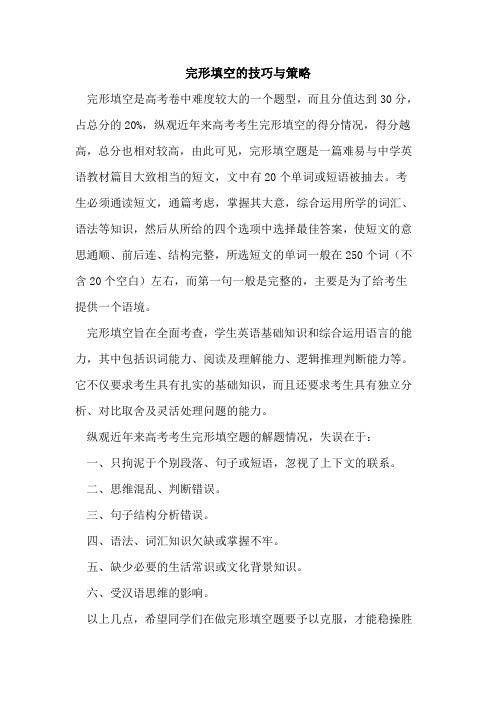
完形填空的技巧与策略完形填空是高考卷中难度较大的一个题型,而且分值达到30分,占总分的20%,纵观近年来高考考生完形填空的得分情况,得分越高,总分也相对较高,由此可见,完形填空题是一篇难易与中学英语教材篇目大致相当的短文,文中有20个单词或短语被抽去。
考生必须通读短文,通篇考虑,掌握其大意,综合运用所学的词汇、语法等知识,然后从所给的四个选项中选择最佳答案,使短文的意思通顺、前后连、结构完整,所选短文的单词一般在250个词(不含20个空白)左右,而第一句一般是完整的,主要是为了给考生提供一个语境。
完形填空旨在全面考查,学生英语基础知识和综合运用语言的能力,其中包括识词能力、阅读及理解能力、逻辑推理判断能力等。
它不仅要求考生具有扎实的基础知识,而且还要求考生具有独立分析、对比取舍及灵活处理问题的能力。
纵观近年来高考考生完形填空题的解题情况,失误在于:一、只拘泥于个别段落、句子或短语,忽视了上下文的联系。
二、思维混乱、判断错误。
三、句子结构分析错误。
四、语法、词汇知识欠缺或掌握不牢。
五、缺少必要的生活常识或文化背景知识。
六、受汉语思维的影响。
以上几点,希望同学们在做完形填空题要予以克服,才能稳操胜券。
完形填空题材广泛,它涉及日常生活、文史知识、科技小品、政治经济,人物、社会、故事等。
体裁以记叙文为主,将来可能会出现说明文,甚至议论文。
近年来高考英语完形填空试题具有下述特点。
(一)文章短,挖空多众所周知,一般来说,文章越短,挖空密度越大,由于失去的语言信息越多,理解文章的难度就越大,解答试题的难度就会相应加大。
不过,从目前高考英语中完形填空试题的选文来看,都不会超越现行高中英语教材的难度。
(二)情景意义选择为主,语法选择填空极少这种试题的特点是:在4个备选项中,孤立地看对应挖空的句子,都能满足句子的要求,无论将哪个答案填进去,从词法上说都是正确的。
要确定此题的正确答案,只能根据全文的内容和情节的发展,使所选答案能满足为文章中心内容服务的需要。
高考完型填空题的解题技巧探究
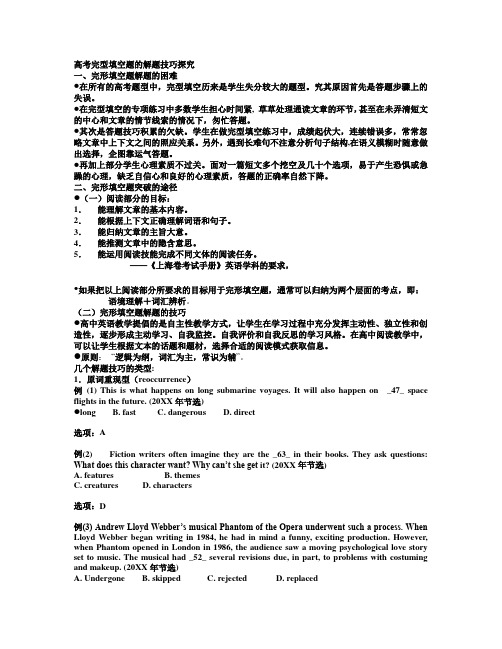
高考完型填空题的解题技巧探究一、完形填空题解题的困难●在所有的高考题型中,完型填空历来是学生失分较大的题型。
究其原因首先是答题步骤上的失误。
●在完型填空的专项练习中多数学生担心时间紧, 草草处理通读文章的环节,甚至在未弄清短文的中心和文章的情节线索的情况下,匆忙答题。
●其次是答题技巧积累的欠缺。
学生在做完型填空练习中,成绩起伏大,连续错误多,常常忽略文章中上下文之间的照应关系。
另外,遇到长难句不注意分析句子结构,在语义模糊时随意做出选择,企图靠运气答题。
●再加上部分学生心理素质不过关。
面对一篇短文多个挖空及几十个选项,易于产生恐惧或急躁的心理,缺乏自信心和良好的心理素质,答题的正确率自然下降。
二、完形填空题突破的途径●(一)阅读部分的目标:1.能理解文章的基本内容。
2.能根据上下文正确理解词语和句子。
3.能归纳文章的主旨大意。
4.能推测文章中的隐含意思。
5.能运用阅读技能完成不同文体的阅读任务。
——《上海卷考试手册》英语学科的要求,•如果把以上阅读部分所要求的目标用于完形填空题,通常可以归纳为两个层面的考点,即:语境理解+词汇辨析。
(二)完形填空题解题的技巧●高中英语教学提倡的是自主性教学方式,让学生在学习过程中充分发挥主动性、独立性和创造性,逐步形成主动学习、自我监控。
自我评价和自我反思的学习风格。
在高中阅读教学中,可以让学生根据文本的话题和题材,选择合适的阅读模式获取信息。
●原则:“逻辑为纲,词汇为主,常识为辅”。
几个解题技巧的类型:1.原词重现型(reoccurrence)例(1) This is what happens on long submarine voyages. It will also happen on _47_ space flights in the future. (20XX年节选)●long B. fast C. dangerous D. direct选项:A例(2) Fiction writers often imagine they are the _63_ in their books. They ask questions: What does this character want? Why can’t she get it? (20XX年节选)A. featuresB. themesC. creaturesD. characters选项:D例(3) Andrew Lloyd Webber’s musical Phantom of the Opera underwent such a process. When Lloyd Webber began writing in 1984, he had in mind a funny, exciting production. However, when Phantom opened in London in 1986, the audience saw a moving psychological love story set to music. The musical had _52_ several revisions due, in part, to problems with costuming and makeup. (20XX年节选)A. UndergoneB. skippedC. rejectedD. replaced选项:ASum up:●在使用“原词重现型”的技巧时,应有意识地在前后文中寻找重复的信息点,特别注意提及到的同一事物,●如例(1)中漫长的水下航行和漫长的太空之旅;同一活动,●如例(2)中小说中的人物;同一情景,●如例(3)中音乐剧作品《歌剧魅影》所经历的修改。
完形填空易挖空部分
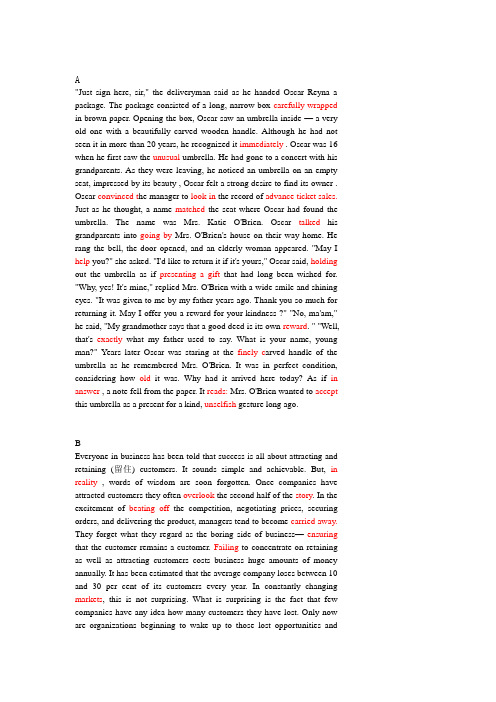
A"Just sign here, sir," the deliveryman said as he handed Oscar Reyna a package. The package consisted of a long, narrow box carefully wrapped in brown paper. Opening the box, Oscar saw an umbrella inside — a very old one with a beautifully carved wooden handle. Although he had not seen it in more than 20 years, he recognized it immediately . Oscar was 16 when he first saw the unusual umbrella. He had gone to a concert with his grandparents. As they were leaving, he noticed an umbrella on an empty seat, impressed by its beauty , Oscar felt a strong desire to find its owner . Oscar convinced t he manager to look in the record of advance ticket sales. Just as he thought, a name matched the seat where Oscar had found the umbrella. The name was Mrs. Katie O'Brien. Oscar talked his grandparents into going by Mrs. O'Brien's house on their way home. He rang the bell, the door opened, and an elderly woman appeared. "May I help you?" she asked. "I'd like to return it if it's yours," Oscar said, holding out the umbrella as if presenting a gift that had long been wished for. "Why, yes! It's mine," replied Mrs. O'Brien with a wide smile and shining eyes. "It was given to me by my father years ago. Thank you so much for returning it. May I offer you a reward for your kindness ?" "No, ma'am," he said, "My grandmother says that a good deed is its own reward. " "Well, that's exactly what my father used to say. What is your name, young man?" Years later Oscar was staring at the finely c arved handle of the umbrella as he remembered Mrs. O'Brien. It was in perfect condition, considering how old it was. Why had it arrived here today? As if in answer , a note fell from the paper. It reads: Mrs. O'Brien wanted to accept this umbrella as a present for a kind, unselfish gesture long ago.BEveryone in business has been told that success is all about attracting and retaining (留住) customers. It sounds simple and achievable. But, in reality , words of wisdom are soon forgotten. Once companies have attracted customers they often overlook the second half of the story. In the excitement of beating off the competition, negotiating prices, securing orders, and delivering the product, managers tend to become carried away. They forget what they regard as the boring side of business—ensuring that the customer remains a customer. Failing to concentrate on retaining as well as attracting customers costs business huge amounts of money annually. It has been estimated that the average company loses between 10 and 30 per cent of its customers every year. In constantly changing markets, this is not surprising. What is surprising is the fact that few companies have any idea how many customers they have lost. Only now are organizations beginning to wake up to those lost opportunities andcalculate the financial implications. Cutting down the number of customers a company loses can make a big difference in its performance. Research in the US found that a five per cent decrease in the number of defecting (流失的) customers led to profit increases of between 25 and 85 per cent. In the US, Domino’s Pizza estimates that a regular customer is worth more than $5,000 over ten years. A customer who receives a poor quality product or service on their first visit and as a result never returns, is losing the company thousands of dollars in potential profits (more if you consider how many people they are likely to tell about their bad experience). The logic behind cultivating customer loyalty is impossible to deny. “In practice most companies’ marketing effort is focused on getting customers, with little attention paid to keeping them”, says Adrian Payne of Cornfield University’ School of Management. “Research suggests that there is a close relationship between retaining customers and making profits. Established customers tend to buy more, are predictable and usually cost less to service than new customers. Furthermore, they tend to be less price sensitive , and may provide free word-of-mouth advertising. Retaining customers also makes it different for competitors to enter a market or increase their share of a market.CWhenever we hear about “the homeless,”, most of us think of the Developing world. But the Truth is that homelessness is everywhere. For example, how many of us would expect to see people living on the streets of a wealthy country like Germany? Kurt Muller and his wife Rita have spent eleven years making meals for the homeless of Berlin, Germany’s capital. They first began one long hot summer when most Germans were away o n holiday. Kurt and his wife stayed at home, made sandwiches, set up a table in the street and gave food to the homeless. The Mullers soon realized that food and clothing weren’t enough . “What these people also need is warmth and caring,” says Rita. The Mullers didn’t hesitate to give their phone number to the street people and told them to phone anytime. Rita make sure there was somebody at home to answer the phone and their home was always open t o anyone who couldn’t face another night on the street. The couple were soon spending all their time and money, so Kurt visited food and clothing companies to ask for donations. Today, over thirty companies regularly donate food and other goods to the cause(事业) and volunteers help to deliver them to the homeless. The public also give clothes and money and a shoe producer donates new shoes. Kurt and Rita receive no payment for their hard work. “ We feel like parents,” says Rita,“and parents shouldn’t expect money for helping their children. The love we get on the streets is our salary.” Though Rita admits she often gets tired . She says she will continue with her work because she likes the feeling of having made a difference to the world.When I settled in Chicago,my new city seemed so big and unfriendly, Then I had a physical problem and had to go to hospital for a thorough(全面的) examination. It seemed a small challenge compared to the one I was about to face ,but things started to go wrong right from the beginning , Not having a car or knowing the city, I was depending on a couple of buses to get me from A to B, although I’d left myself plenty of time, soon it was obvious I was going to be late, as I had mistakenly boarded a bus that was taking me in the opposite direction. I got off the bus and stood on the pavement not knowing what to do, I look into the eyes of a stranger who was trying to get past me, Surprisingly instead of moving on ,she stopped to ask if I was OK , After I explained my situation to her, she pointed to a bus stop across the street , where a bus would take me back into the city to my appointment . Sitting there waiting , I felt grateful that someone had been willing to help . Then, hearing a horn (喇叭)nearby, I looked up to see a car with my new friend waving at me to get in, She had returned to offer me a lift to the hospital. Such unexpected kindness from a passer-by was a lovely gift to receive, As I climbed out of the car at the hospital and turned to thank her, she smiled and told me not to lose faith,for all things are possible.。
高中英语完型填空训练20个空附答案
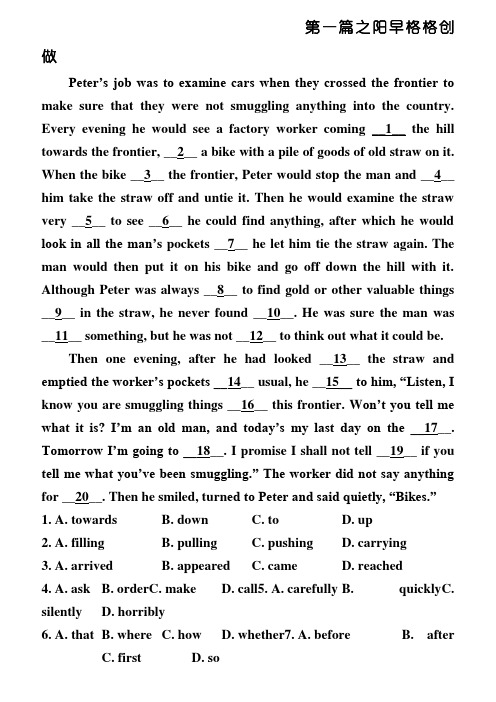
第一篇之阳早格格创做Peter’s job was to examine cars when they crossed the frontier to make sure that they were not smuggling anything into the country. Every evening he would see a factory worker coming __1__ the hill towards the frontier, __2__ a bike with a pile of goods of old straw on it. When the bike __3__ the frontier, Peter would stop the man and __4__ him take the straw off and untie it. Then he would examine the straw very __5__ to see __6__ he could find anything, after which he would look in all the man’s pockets __7__ he let him tie the straw again. The man would then put it on his bike and go off down the hill with it. Although Peter was always __8__ to find gold or other valuable things __9__ in the straw, he never found __10__. He was sure the man was __11__ something, but he was not __12__ to think out what it could be.Then one evening, after he had looked __13__ the straw and emptied the worker’s pockets __14__ usual, he __15__ to him, “Listen, I know you are smuggling things __16__ this frontier. W on’t you tell me what it is? I’m an old man, and today’s my last day on the __17__. Tomorrow I’m going to __18__. I promise I shall not tell __19__ if you tell me what you’ve been smuggling.” The worker did not say anything for __20__. Then he smiled, turn ed to Peter and said quietly, “Bikes.”1. A. towards B. down C. to D. up2. A. filling B. pulling C. pushing D. carrying3. A. arrived B. appeared C. came D. reached4. A. ask B. orderC. make D. call5. A. carefully B. quicklyC. silently D. horribly6. A. that B. where C. how D. whether7. A. before B. afterC. firstD. so8. A. lucky B. hoping C. thinking D. wondering9. A. had been B. hidden C. hiding D. have been10. A. nothing B. something C. everything D. anything11. A. taking B. smuggling C. stealing D. pushing12. A. possible B. strong C. able D. clever13. A. through B. thoroughly C. upon D. up14. A. like B. moreC. then D. as15. A. told B. cried C. ordered D. said16. A. cross B. past C. across D. into17. A. thing B. workC. jobD. duty18. A. rest B. back C. retire D. retreat19. A. everyone B. anyone C. no oneD. someone20. A. moment B. long time C. sometime D. some time第一篇问案名师面评那篇完型挖空道述了身为边防查看员的彼得明知一个工厂工人正在走公货品却无法抓住对于圆的痛处.正在退戚的前一天,彼得恳请其道出真相,截止令彼得名顿开.问案简析1.D.根据下文那个工人越过鸿沟后,走下山坡,所以到达鸿沟之前应正在往山上走.故选up.2.C.那名工人是正在推着一辆拆有稻草的自止车,故选动词汇pushing.3.D.那里表白的是到达鸿沟之意arrive, come为不迭物动词汇不可曲交交 the frontier,故选reached.4.C.ask与order后交大概式的复合结构时,动词汇前应有to, make 后交大概式的复合结构时,动词汇前to要省去.根据下文应选make.5.A.彼得念创造那个工人正在走公什么,所以应小心天查看.故选carefully.6.D.那里根据文意,应采用表示“是可”之意的whether做宾语从句的带领词汇.7.A.根据常理,彼得应先查看那个工人的心袋才搞让他捆起稻草走人,故选before.8.B.根据文意,彼得心中背去怀着查获走公东西的期视,故选hoping.9.B.那里things战hide之间是主动闭系,当前分词汇hiding做定语时表示主动,所以应用往日分词汇hidden做后置定语表主动. 10.D.本句中可定词汇never及文意决断了那里应选 anything. 11.B.四个选项从语法上道皆不妨,只可从文意上举止区别,smuggling意为“走公”,是精确选项.12.C.牢固结构be able to do sth. 意为“不妨搞某事”.13.A.习惯用语look through 意为“真足查看”.14.D.“as usual”为牢固短语,意为“象寻常一般”.15.D.tell, order后里应曲交交人做宾语表示报告某人战下令某人,而用say应为say to sb. 故said为精确选项.16.C.那里应采用一个介词汇形成介词汇短语正在句中搞状语.介词汇past 表“通过”;across 强调“从一边到另一边”;而into 表示“加进到……内里”. 根据文意across应为精确选项.17.C.“on the job”为一时常使用短语.意为“真止公务”.18.C.果为即日是彼得末尾一天上班证明显天他便要退戚retire.19.B.根据句中可定词汇not 及文意应选anyone.20.D.本句证明那个工人回问彼得的问题之前重默了一会女.A选项应用a moment;C选项表示某一面时间;D选项表示一段时间或者一会女,为精确选项.第二篇If you want to learn a new language, the very first thing to think about is why. Do you need it for a ___36_____ reason, such as your job or your studies?___37____ perhaps you’re interested in the ___38____ ,films or music of a different country and you know how much it will help to have a ___39____ of the language.Most people learn best using a variety of ___40____, but traditional classes are an ideal(理念的)start for many people. They ___41___ an environment where you can practice under the ___42___ of someone who’s good at the language. We all lead ___43___ lives and learning a language takes __44___. You will have more success if you study regularly, so try to develop a ___45___. It doesn’t matter if you haven’t got long. Becoming fluent in a language will take years, but learning to get by takes __46____.Many people start learning a language and soon give up. “I’m too __47___,” they say. Yes, children do learn languages more __48___ than adults, but research has shown that you can learn a language at any ___49___. And learning is good for the health of your brain, too. I’ve also heard people ___50___ about the mistakes they make when ___51___. Well, relax and laugh about your mistakes __52____ you’re much less likely to make them again.Learning a new language is never ___53___. But with some work and devotion, you’ll make progress. And you’ll be ___54____ by the positive reaction of some people when you say just a few words in ___55___ own language. Good luck!36. A. technical B. political C. practical D. physical37. A. After B. So C. Though D. Or38. A literature B. transport C. agriculture D. medicine39. A view B. knowledge C. form D. database40. A paintings B. regulations C. methods D. computers41. A. protect B. change C. respect D. provide42. A. control B. command C. guidance D. pressure43. A. busy B. happy C. simple D. normal44. A. courage B. time C. energy D. place45. A. theory B. business C. routine D. project46. A. some risks B. a lot less C. some notes D. a lot more47. A. old B. nervous C. weak D. tired48. A. closely B. quickly C. privately D. quietly49. A. age B. speed C. distance D. school50. A. worry B. hesitate C. think D. quarrel51. A. singing B. working C. bargaining D. learning52. A. if B. and C. but D. before53. A. tiresome B. hard C. interesting D. easy54. A. blamed B. amazed C. interrupted D. informed55. A. their B. his C. our D. your第二篇问案36-40CDABC 41-45 DCABC 46-50 BABAA 51-55DBDBA第三篇A Leap(跳跃)to Honor Leaping on a narrow balance beam(仄稳木)is not easy. But Lola Walter, a 13-year-old gymnast, is an expert at it.To perfect her skills, Lola 36 for four hours a day, five days a week. At the state championships in March, she finished seventh out of 16 girls. That’s especially impressive.37 she is legally blind, born with a rare condition that causes her eyes to shift constantly. She often sees double and can’t 38 how far away things are.When she was little, her mom 39 that even thou gh she couldn’t see 40 , she was fearless. So her mom signed her up for gymnastics when she was three. She loved the 41 right away and gymnastics became her favorite.Though learning gymnastics has been more 42 for her than for some of her tourn aments, she has neverquit. She doesn’t let her43 stop her from doing anything that she wants to.She likes the determination it takes to do the sport. Her biggest 44is the balance beam. Because she has double vision, she often sees to beams. She must use her sense of touch to help her during her routine. Sometimes she even closes her eyes. “You have to45your mind that it’ll take you where you want to go.” says Lola.To be a top-level gymnast, one must be brave. The beam is probably the most 46 for an yone because it’s four inches wide. At the state competition, Lola didn’t fall47 the beam. In fact, she got an 8.1 out of 10--her highest score yet.Lola doesn’t want to be 48 differently from the other girls on her team. At the competitions, the jud ges don’t know about her vision49. She doesn’t tell them, because she doesn’t think they need to know. Her mom is amazed by her 50attitude.Lola never thinks about 51. She is presently at level 7 while the highest is level 10 in gymnastics. Her 52 is to reach level 9. She says she wants to be a gymnastics coach to pass down what she’s learned toother kids 53 she grew up.Lola is 54 of all her hard work and success. She says it’s helped her overcome problems in her lifeoutside gymnastics, too. Her 55 for others is “just believe yourself”.36. A. runs B. teaches C. trains D. dances37. A. since B. unless C. after D. though38. A. tell B. guess C. assume D. predict39. A. suspectedB. remembered C. imagined D. noticed40. A. deeply B. wellC. ahead D. closely41. A. task B. sport C. eventD. show42. A. boring B. enjoyable C. different D. unsatisfactory43. A. talent B. QualityC. nature D. Condition44. A. doubtB. advantageC. challengeD. program45. A. examine B. express C. open D. trust46. A. fearful B. harmfulC. unfairD. inconvenient47. A. to B. on C. off D. against48. A. greeted B. treated C. served D. paid49. A. pains B. stresses C. injuries D. problems50. A. positive B. friendly C. flexible D. caution51. A. defending B. quitting C. winning D. bargaining52. A. standard B. range C. view D. goal53. A. until B. as C. when D. before54. A. proud B. tired C. ashamed D. confident55. A. plan B. adviceC. reward D. responsibility第三篇问案36-40: CAADB 41-45:BCDCD 46-50:ACBDA 51-55:BDCAB第四篇When Joe was about to start school, all signs pointed to success. Yet things turned out to be quite 36 .The fourth grade even found him at the 37 of the class. Joe struggled day and night, but it did not 38 —until one stormy afternoon.On that afternoon,39 the math teacher started to introduce difficult concepts, dark clouds covered the sky, and the stone ad in. Hard thou she tried to make the kids, 40 ,the thunder won the battle for their attention.No one 41 the concepts. Except Joe. He understood them and answered all the questions correctly. The teacher patted him on the back and told him to go around to the others and explain how he had managed it.42 by his newfound success. Joe moved quickly throughout the room. Soon math time was followed by the time for 43.All children naturally drew 44 pictures on such a day. Except for Joe.Since then, Joe started 45. Though he never made it to the top, his math teacher was always 46 and curious about the change: Why had that stormy day changed Joe?On the day Joe graduated, he presented the teacher with his moat 47 possession—the picture ofbright yellow sun.On the picture Joe had written: This is the day I 48 my brightness... happen B. work C. finish D. last39.A.until B. since C. because D.asate B. change C. hide D. sit41.A.challenged B. grasped C. doubted D. admittedved B. surprised C. Encouraged D.Puzzled43.A. class B. sports C. art D. tea44.A .great B. dark C. different D. strange45.A .improving B. painting C. recovering D. studying46.A. worried B. amazed C. friendly D. cautious47.A .familiar B. expensive C. admirable D. precious48.A. familiar B. expensive C. admirable D. precious49.A.woke up to B. put up with C. got on with D. looked down upon第四篇问案 36-40CDBDA 41-45BCCBA 46-50BDACD 51-55ACBAD第五篇We have been driving in fog all morning, but the fog is lifting now. The little seaside villages are 36, one by one. "There is my grandmother's house," I say, 37 across the bay to a shabby old house.I am in Nova Scotia on a pilgrimage (往圣) with Lise, my granddaughter, seeking roots for her, retracing (逃溯) 38 memory for me. Lise was one of the mobile children, 39 from house to house in childhood. She longs for a sense of 40, and so we have come to Nova Scotia where my husband and I were born and where our ancestors 41 for 200 years.We soon 42 by the house and I tell her what it was like here, the memories 43 back, swift as the tide (潮流).Suddenly, I long to walk again in the 44 where I was once so gloriously a child. It still 45 a member of the family, but has not been lived in for a while. We cannot go into the house, but I can still walk 46 the rooms in memory. Here, my mother 47 in her bedroom window and wrote in her diary. I can still see the enthusiastic family 48 into and out of the house.I could never have enough of being 49 them. However, that was long after those childhood days. Lise 50 attentively as I talk and then says, " So this is where I 51; where I belong. "She has 52 her roots.To know where I come from is one of the great longings of the human 53 . To be rooted is "to have an origin". We need 54 origin. Looking backward, we discover what is unique in us; learn the 55 of "I". We must all go home again—in reality or memory.36. A. appearing B. moving C. exposing D. expanding37. A. referring B. travelling C. pointing D. coming38. A. shared B. short C. fresh D. treasured39. A. passedB. raisedC. movedD. sent40. A. home B. duty C. reality D. relief41. A. built B. lived C. remained D. explored42. A. catch up B. pull up C. step down D. come down43. A. falling B. turning C. rushing D. bringing44. A. yard B. village C. room D. house45. A. adapts to B. appeals to C. belongs to D. occurs to46. A. across B. through C. along D. past47. A. lay B. playedC. stood D. sat48. A. marching B. looking C. breaking D. pouring49. A. between B. with C. near D. behind50. A. wonders B. listens C. reacts D. agrees51. A. began B. grew C. studied D. stayed52. A. deepened B. recognized C. accepted D. found53. A. heart B. rights C. interest D. behaviors54. A. oneB. its C. that D. every55. A. meaningB. expression C. connection D. background第五篇问案36-40. ACDCA41-45. BBCDC 46-50. BDDBB51-55. ADACA第六篇Zigfried, a little mouse, blew his breath on the frosty window of the farmhouse and rubbed it to see the outside. Still nobody came. Maybe today, he thought 31 . It was only a few days before Christmas and he was watching for a miracle (偶妙).This farmhouse had been 32 too long. It needed a family. Zigfried’s33 made a noise. He realized that he hadn’t eaten an ything since yesterday. He jumped from the windowsill (窗沿), grabbed a 34 from his home, and went next door to Farmer Mike’s.Farmer Mike’s house had been a great place for the little mouse 35 the farmer married a wife who had a cat. Zigfried 36 when he thought of it. He looked around cautiously as he 37 into the room where grain was stored and was quite 38 as he filled his bag with wheat. He was turning to leave when suddenly he 39 a hot breath about his ear. His heart beat 40 , and without thinking he started to run and luckily 41 the cat’s paws (爪子).The next afternoon Zigfried heard some good news: a 42 family would be moving into the farmhouse soon. Zigfried’s granny would arrive on Christmas Eve to43 with him. He hoped that the family would come before his granny came. Before long, a car came 44 the road leading to the house, with butter sandwiches, cheese and chocolate.Zigfried’s Christmas miracle did arrive!The house came 45 the next few days. Zigfried 46 every single hour of them. 47 , the day before Christmas when he was drinking hot chocolate with a 48 smile at the door of his home, he heard the 49 of the children of the family about what they might get for Christmas. What? A cat? The 50 froze on his face; his mouth fell wide open. After a long while, he at last found his voice: “Hey! Whose Christmas miracle is this?”31. A. carefully B. excitedly C. hopefully D. proudly32. A. shabby B. noisy C. messyD. empty33. A. mouth B. nose C. stomach D. throat34. A. bag B. stick C. bowl D. coat35. A. although B. until C. whereas D. unless36. A. leapt B. sniffedC. trembledD. withdrew37. A. broke B. marched C. paced D. stole38. A. curious B. nervous C. pitiful D. sensible39. A. took B. released C. felt D. drew40. A. strongly B. irregularly C. slowly D. wildly41. A. escaped B. seized C. rubbed D. scratched42. A. close B. happy C. new D. young43. A. celebrate B. communicate C. competeD. compromise44. A. across B. from C. off D. up45. A. alive B. loose C. open D. still46. A. counted B. enjoyed C. missed D. wasted47. A. However B. Instead C. Moreover D. Therefore48. A. bitter B. forced C. polite D. satisfied49. A. introduction B. discussion C. comment D. debate50. A. blood B. smile C. tear D. sweat第六篇问案31-35. CDCAB 36-40. CDBCD41-45. ACADA 46-50. BADBB第七篇Diane Ray was completely self-centered and very spoilt. Her parents gave her 36 she wanted, knowing that she would throw a temper tantrum(耍小孩脾气)if they did not. She would scream and kick and 37 on the floor drumming her heels. Her parents always 38 .That was why she was alone on the 39 , wearing an expensive swimsuit. It had taken a massive tantrum to 40 her parents to buy it. They were back at the beach-house, 41 from the tantrum she had thrown when they told her that it was too dangerous to go diving 42 . “Dangerous ?” she had said. “You just don’t want me to have 43 . I’m going and if you try to stop me, I’ll scream.”“What are you doing ?” a voice asked. Diane jumped. She did not know that the man was there 44 he spoke .“I’m going diving, ” she answered.“You shouldn’t swim that day, ” the man 45 . “There is a storm coming up.”“You should mind your own 46 !” Diane replied and walked into the gentle waves.“If you go out there you’ll be 47 ,” the man called afte r her. She did not bother to reply.Diane slipped into the water and dived 48 until white caps began rolling in and it became harder to 49 against the current (火流). Saltwater hit against her face, making it 50 to breathe. Oh, why had she not listened to advice.Panicking, she began to 51 . Then, just as it seemed as if shewould slip beneath the surface, she heard a 52 voice. “Hold on ! I’m coming.” With 53 , she say the old man rowing an ancient-looking boat towards her. “I hope you’ve lear ned a lesson. You put us both in 54 , ” he shouted angrily, as he dragged her over the side of the 55 . Gratefully, Diane thanked him and ran towards the beach-house.36. A. either B. neither C. nothing D. everything37. A. jumpB. LieC. spinD. sleep38. A. set out B. set in C. gave in D. gave out39. A. beach B. bed C. floor D. ship40. A. allow B. warn C. get D. prefer41. A. changing B. recovering C. appearing D. traveling42. A. alone B. away C. again D. aside43. A. time B. money C. food D. fun44. A. when B. until C. after D. once45. A. decided B. intended C. advised D. repeated46. A. business B. swimsuit C. friends D. parents47. A. angry B. sorry C. confused D. excited48. A. nervously B. sadly C. shyly D. happily49. A. rise B. swim C. stop D. row50. A. difficult B. easy C. comfortable D. suitable51. A. speak B. sing C. sniff D. scream52. A. calm B. frightening C. beautiful D. disgusting53. A. regret B. relief C. interest D. ease54. A. power B. safety C. danger D. thought55. A. house B. wave C. beach D. boat第七篇问案36-40. DBCAC 41-45. BA DBC 46-50. ABDBA 51-55. DABCD第八篇A little girl lived in a simple and poor house on a hill. Usually she 36 play in the small garden. She could see over the garden fence and across the valley a wonderful house with shining golden windows high on another hill. 37 she loved her parents and her family, she desired to live in such a house and 38 all day about how wonderful and exciting 39 must feel to live there.At the age when she gained some 40 skill and sensibility(辨别力), she 41 her mother for a bike ride ___42 the garden. Her mother finally allowed her to go, 43 her keeping close to the house and not 44 too far. The day was beautiful. The little girl knew 45 where she was heading!46 the hill and across the valley, she rode to the 47 of the golden house.48 she got off her bike and put it against the gate post, she focused on the path _49 _ to the house and then on the house itself. She was very disappointed when she 50 that all the windows were 51 and rather dirty.So 52 and heart-broken, she didn’t go any further. She 53 , and all of a sudden she saw an amazing ___54 . There on the other side of the valley was a little house and its windows were golden. Looking at her little home, she _55 __ that she had been living in her golden house filled with love and care. Everything she dreamed was right there in front of her house.36. A. might B. should C. would D. must37. A. Unless B. Although C. Since D. But38. A. dreamed B. worried C. asked D. shouted39. A. this B. that C. it D. which40. A. different B. scientific C. musical D. basic41. A. begged B. blamed C. invited D. paid42. A. inside B. outside C. through D. along43. A. insisting on B. relying on C. arguing about D. wondering about44. A. traveling B. running C. riding D. walking45. A. madly B. rapidly C. exactly D. possibly46. A. Over B. Down C. Around D. Beside47. A. windows B. steps C. center D. gate48. A. Until B. As C. While D. Because49. A. getting B. introducing C. leading D. moving50. A. felt B. learned C. concluded D. found51. A. transported B. bright C. plain D.wide52. A. anxious B. angry C. serious D. sad53. A. turned down B. cheered up C. settled down D. dropped in54. A. hill B. valley C. background D. sight55. A. imagined B. decided C. realized D. guessed第八篇问案 36-40CBACD41-45ABACC 46-50BDBCD 51-55CDADC第九篇I used to be a very self-centered person, but in the past two years I have really changed. I have started to think about other people 36 I think about myself. I am happy that I am becoming a 37 person.I think my 38 started when I was at PalomarCollege. At first, I just wanted to get my 39 and be left alone. I thought I was smarter than everyone else, so I hardly ever 40 to anyone in my classes. By the end of my first semester, I was really 41 . It seemed as if everyone but me had made friends and was having fun. So tried a(n) 42 . I started asking people around me how they were doing, and if they were having trouble I 43 to help. That was really a big 44 for me. By the end of the year, I had several new friends, and two of 45 are still my best friends today.A bigger cause of my new 46 , however, came when I took a part-time job at a Vista Nursing Home. One old lady there who had Alzheimer’s disease became my 47 . Every time I came into her room, she was so48 because she thought I was her daughter. Her real daughter never49 her, so I took her place. She let me 50 . that making others feel good make me feel good, too, when she died, I was 51 , but I was very grateful to her.I think I am a much 52 person today than I used to be, and I hope I will not 53 these experiences. They have 54 me to care about other people more than about myself. I 55 who I am today, and I could not say that a few years ago.36. A. since B. before C. or D. unless37. A. famous B. simple C. different D. skilled38. A. education B. career C. tour D. change39. A. balance B. homework C. degree D. interest40. A. talked B. wrote C. lied D.reported41. A. careful B. lonely C. curious D. guilty42. A. argument B. game C. experiment D. defence43. A. dared B. offered C. hesitated D. happened44. A. dream B. problem C. duty D. step45. A. us B. which C. them D. whom46. A. attitude B. hobby C. hope D. luck47. A. friend B. partner C. guide D. guest48. A. polite B. happy C. strange D. confident49. A. bothered B. answered C. visited D. trusted50. A. explain B. guess C. declare D. see51. A. homeless B. heartbroken C. bad-tempered D. hopeless52. A. quieter B. busier C. better D. richer53. A. forget B. face C. improve D. analyze54. A. forced B. preferred C. ordered D. taught55. A. miss B. like C. wonder D. expect 第九篇问案 36-40BCDCA 41-45 BCBDC 46-50AABCD 51-55BCADB第十篇"Look, it's Baldy!" A boy shouted in my direction across the playground. Even though I was used to regular insults(侮宠) because of the 11 on my head, it was 12 horrible to hear. I sighed as I headed back to the class.When I was just 20 months old, I suffered serious 13 after a bowl full of hot oil fell on my head. I was 14 to hospital and had to say there for weeks while the doctors 15 to save my life. "Holly's very 16 to be alive," they told Mum and Dad. "But she'll be 17 with scars on her head, and of course her hair won't grow there."As a child, I cared much about my scars, so I 18 wore a scarf to cover them up when I left home. 19 I didn't, people would call me horrible names like Baldy. Although my friends were always comforting me ,they never 20 understood how it felt.Then through the hospital I was 21 to a children's burns camp, where children like me can get any help. There, I 22 14-year-old Stephanie, whose burns are a lot more serious than mine. But she is so 23 that she never lets anyone put her down. "You shouldn't 24 what peoplesay about what you look like because we're not different from anyone else, Holly," she 25 me. "And you don't need to wear a scarf because y0ou look great 26 it!" For the first time in my life I could speak to someone who'd been through something 27 . So weeks later, at my 13th birthday party, 28 by her bravery, I gave up my scarf and showed off my scars. It felt amazing not having to 29 away behind my scarf.Now, I am 30 of what I look like and much happier, because I have realized it is your personality(本性)that decides who you truly are.11. A. hat B. scarf C. scars D. cuts 12. A. still B. just C. never D. seldom13. A. hunger B. cold C. defeats D. burns 14. A. rushed B. ledC. invitedD. forced15. A. learned B. fought C. returned D. decided 16. A. happy B. lucky C. lonely D. poor17. A. pressed B. occupied C. left D. painted18. A. possibly B. usually C. finally D. nearly19. A. Although B. Since C. If D. Before20. A. correctly B. roughly C. easily D. really21. A. promoted B. introduced C. reported D. carried22. A. met B. recognized C. remembered D. caught23. A. honest B. strong C. active D. young24. A. write down B. agree with C. pass on D. listen to25. A. promised B. encouraged C. ordered D. calmed26. A. in B. for C. without D. beyond27. A. similar B. strangeC. hardD. important28. A. allowed B. required C. guided D. inspired29. A. hide B. give C. keep D. put 30. A. sick B. aware C. tired D. proud第十篇问案 11. C 12. A 13. D 14. A 15. B 16. B 17. C 18. B 19. C20. D21. B 22. A 23. B 24. D 25. B 26. C 27. A 28. D 29. A 30. D第十一篇As I held my father’s hands one night, I couldn’t help but notice their calluses(老茧)and roughness. His hands tell the story of his life as a 16 , including all his struggles.One summer, I remember, a drought (涝灾)hit Ontario, turning it into a 17 desert. On one of those hot mornings I was picking sweet corn with my dad to fill the last 18 from the grocery store. Fifty dozen wasall we needed, which 19 took twenty minutes. That morning, however, the process didn’t 20 quickly. After forty minutes of aimlessly walking in the field, we 21 needed twenty dozen. I was completely frustrated and 22 . Dropping the basket heavily, I declared, “If the store wants its last twenty dozen, they can pick it themselves1”Dad 23 . “Just think, my little girl, only ten dozen left for each of us and then we’re 24 .” Such is Dad----whatever problem he 25 , he never gives up.26 , the disastrous effects of the drought were felt all over our county. It was a challenging time for everyone, 27 Dad remained optimistic. He 28 to be grateful for other things like good health and food on our plated. Only then did I truly begin to 29 Dad and his faith that guided us through the hard times.Dad is also a living example of real 30 . From dawn to dusk, he works countless hours to 31 our family. He always puts our happiness 32 his own, and never fails to cheer me on at my sports games 33 his exhaustion after long days. His loving and selfless nature has inspired me to become more sympathetic and 34 putting others first.Dad,the life 35 I have learned from you will stay with me forever. You are my father, teacher, friend and, most importantly, my hero.16.A. teacher B. gardener C. farmerD. grocer17.A. stormy B. lively C. disappearingD. burning18.A. order B. form C. gap D.position19.A. repeatedly B. normally C. finallyD. really20.A. go B. begin C. occur D. change 21.A. yet B. still C.even D. nearly22.A. surprised B. nervous C. angry D. frightened23.A. apologized B. cried C. complainedD. laughed24.A. lost B. done C. gone D. touched25.A. meets with B. brings up C. works outD. thinks about26.A. Thankfully B. Hopefully C.。
高考完形填空解题技巧

第一讲题目怎么命——一篇“美文佳作”,肢解“七零八落”要弄明白一个东西“是什么”,就要知道它“从哪里来,要到哪里去”。
要做好完形填空,就要对其命题过程有所了解,这样才能够轻松躲避出题陷阱,选出正确选项。
就如同那句话,“你找到了限制,就找到了自由”。
完形填空所选语段的原型是一篇地道的完整的英语美文,是命题组的老师为高考命题所需绞尽脑汁从中挖去若干词汇所为。
“完形填空”,顾名思义就是通过“填空”,使一篇被挖出若干空格、肢解得“七零八落”的文章恢复其原来完整的模样。
第一步:选文章首先命题组要根据考试大纲和考试说明的要求,从英美国家杂志或网站上寻找一篇千词左右的文章,然后改造成一篇难度和长度都很合适的、适宜于挖空的二、三百词的语言材料。
该语言材料在选材和体裁上一般要具备以下特点:1.选材从题材来看,高考完形填空题的选材新颖、时尚,注重知识、文化、教育与品位有机结合,符合中学生的阅读兴趣。
题材广泛,涉及人物故事、教育、社会经济、文化发展等。
例如2014年浙江卷“老师无意中的表扬却使学生改变很大”;2014年北京卷“老师帮助一位小女孩获得同学们的认可”;2014年湖南卷“妈妈通过教孩子熨衣服,使孩子学会如何处理生活中的棘手之事”;2014年重庆卷的第二篇“要入乡随俗”;2014年广东卷“就父母与孩子们的关系进行讨论”等。
2.体裁从体裁来看,高考完形填空题通常以记叙文或夹叙夹议的文章为主,偶尔会出现议论文或说明文。
以2014年高考为例,除了广东卷考的是议论文、重庆卷第二篇考的是说明文之外,其他省份考的都是记叙文或夹叙夹议的文章。
第二步:挖空格命题组找到了合适的文章后,就要准备动手挖去一些词汇,确定供考生处理的空格的位置,挖空时一般遵循以下原则:1.文章首句一般不设空首句一般不设空,目的是让考生迅速进入主题,熟悉语言环境,建立正确的思维导向。
首句一般暗示了文章的主题、背景、时间、地点、人物以及事件的起因等,这些元素实际上给我们理解原文和选择正确答案限定了范围,指明了方向。
- 1、下载文档前请自行甄别文档内容的完整性,平台不提供额外的编辑、内容补充、找答案等附加服务。
- 2、"仅部分预览"的文档,不可在线预览部分如存在完整性等问题,可反馈申请退款(可完整预览的文档不适用该条件!)。
- 3、如文档侵犯您的权益,请联系客服反馈,我们会尽快为您处理(人工客服工作时间:9:00-18:30)。
A"Just sign here, sir," the deliveryman said as he handed Oscar Reyna a package. The package consisted of a long, narrow box carefully wrapped in brown paper. Opening the box, Oscar saw an umbrella inside — a very old one with a beautifully carved wooden handle. Although he had not seen it in more than 20 years, he recognized it immediately . Oscar was 16 when he first saw the unusual umbrella. He had gone to a concert with his grandparents. As they were leaving, he noticed an umbrella on an empty seat, impressed by its beauty , Oscar felt a strong desire to find its owner . Oscar convinced t he manager to look in the record of advance ticket sales. Just as he thought, a name matched the seat where Oscar had found the umbrella. The name was Mrs. Katie O'Brien. Oscar talked his grandparents into going by Mrs. O'Brien's house on their way home. He rang the bell, the door opened, and an elderly woman appeared. "May I help you?" she asked. "I'd like to return it if it's yours," Oscar said, holding out the umbrella as if presenting a gift that had long been wished for. "Why, yes! It's mine," replied Mrs. O'Brien with a wide smile and shining eyes. "It was given to me by my father years ago. Thank you so much for returning it. May I offer you a reward for your kindness ?" "No, ma'am," he said, "My grandmother says that a good deed is its own reward. " "Well, that's exactly what my father used to say. What is your name, young man?" Years later Oscar was staring at the finely c arved handle of the umbrella as he remembered Mrs. O'Brien. It was in perfect condition, considering how old it was. Why had it arrived here today? As if in answer , a note fell from the paper. It reads: Mrs. O'Brien wanted to accept this umbrella as a present for a kind, unselfish gesture long ago.BEveryone in business has been told that success is all about attracting and retaining (留住) customers. It sounds simple and achievable. But, in reality , words of wisdom are soon forgotten. Once companies have attracted customers they often overlook the second half of the story. In the excitement of beating off the competition, negotiating prices, securing orders, and delivering the product, managers tend to become carried away. They forget what they regard as the boring side of business—ensuring that the customer remains a customer. Failing to concentrate on retaining as well as attracting customers costs business huge amounts of money annually. It has been estimated that the average company loses between 10 and 30 per cent of its customers every year. In constantly changing markets, this is not surprising. What is surprising is the fact that few companies have any idea how many customers they have lost. Only now are organizations beginning to wake up to those lost opportunities andcalculate the financial implications. Cutting down the number of customers a company loses can make a big difference in its performance. Research in the US found that a five per cent decrease in the number of defecting (流失的) customers led to profit increases of between 25 and 85 per cent. In the US, Domino’s Pizza estimates that a regular customer is worth more than $5,000 over ten years. A customer who receives a poor quality product or service on their first visit and as a result never returns, is losing the company thousands of dollars in potential profits (more if you consider how many people they are likely to tell about their bad experience). The logic behind cultivating customer loyalty is impossible to deny. “In practice most companies’ marketing effort is focused on getting customers, with little attention paid to keeping them”, says Adrian Payne of Cornfield University’ School of Management. “Research suggests that there is a close relationship between retaining customers and making profits. Established customers tend to buy more, are predictable and usually cost less to service than new customers. Furthermore, they tend to be less price sensitive , and may provide free word-of-mouth advertising. Retaining customers also makes it different for competitors to enter a market or increase their share of a market.CWhenever we hear about “the homeless,”, most of us think of the Developing world. But the Truth is that homelessness is everywhere. For example, how many of us would expect to see people living on the streets of a wealthy country like Germany? Kurt Muller and his wife Rita have spent eleven years making meals for the homeless of Berlin, Germany’s capital. They first began one long hot summer when most Germans were away o n holiday. Kurt and his wife stayed at home, made sandwiches, set up a table in the street and gave food to the homeless. The Mullers soon realized that food and clothing weren’t enough . “What these people also need is warmth and caring,” says Rita. The Mullers didn’t hesitate to give their phone number to the street people and told them to phone anytime. Rita make sure there was somebody at home to answer the phone and their home was always open t o anyone who couldn’t face another night on the street. The couple were soon spending all their time and money, so Kurt visited food and clothing companies to ask for donations. Today, over thirty companies regularly donate food and other goods to the cause(事业) and volunteers help to deliver them to the homeless. The public also give clothes and money and a shoe producer donates new shoes. Kurt and Rita receive no payment for their hard work. “ We feel like parents,” says Rita,“and parents shouldn’t expect money for helping their children. The love we get on the streets is our salary.” Though Rita admits she often gets tired . She says she will continue with her work because she likes the feeling of having made a difference to the world.When I settled in Chicago,my new city seemed so big and unfriendly, Then I had a physical problem and had to go to hospital for a thorough(全面的) examination. It seemed a small challenge compared to the one I was about to face ,but things started to go wrong right from the beginning , Not having a car or knowing the city, I was depending on a couple of buses to get me from A to B, although I’d left myself plenty of time, soon it was obvious I was going to be late, as I had mistakenly boarded a bus that was taking me in the opposite direction. I got off the bus and stood on the pavement not knowing what to do, I look into the eyes of a stranger who was trying to get past me, Surprisingly instead of moving on ,she stopped to ask if I was OK , After I explained my situation to her, she pointed to a bus stop across the street , where a bus would take me back into the city to my appointment . Sitting there waiting , I felt grateful that someone had been willing to help . Then, hearing a horn (喇叭)nearby, I looked up to see a car with my new friend waving at me to get in, She had returned to offer me a lift to the hospital. Such unexpected kindness from a passer-by was a lovely gift to receive, As I climbed out of the car at the hospital and turned to thank her, she smiled and told me not to lose faith,for all things are possible.。
